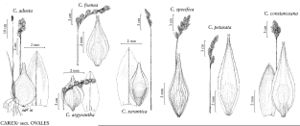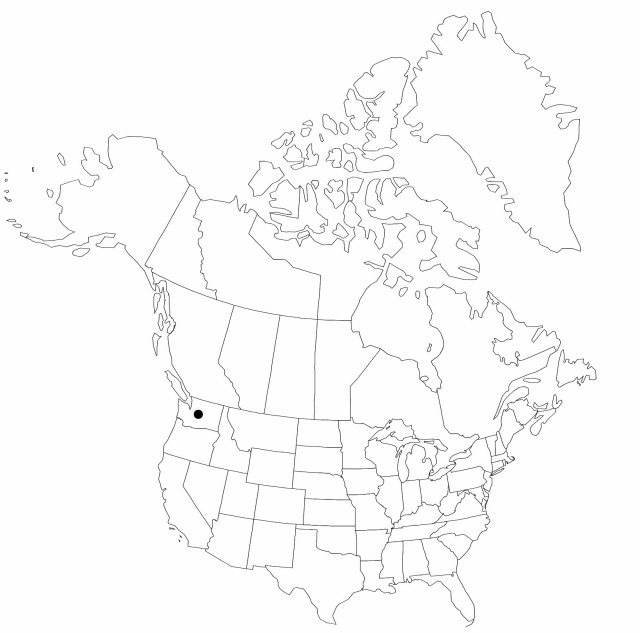Carex constanceana
Leafl. W. Bot. 2: 123. 1938.
Plants densely cespitose. Culms 25–35 cm. Leaves: sheaths adaxially white-hyaline, summits U-shaped or rounded, sometimes prolonged beyond collar and rounded; distal ligules 1–3 mm; blades (2–)3–5 per fertile culm, 4–15 cm × 2–3 mm. Inflorescences open, orange-brown or greenish, 2.5–4 cm × 13–15 mm; proximal internode 6–12 mm; 2d internode 2–6 mm; proximal bracts scalelike or bristlelike, shorter than inflorescences. Spikes 3–7, distant, distinct, oblanceloid to obovoid, 14–21 × 7–10 mm, base attenuate, apex acute to rounded. Pistillate scales orange- or red-brown to coppery, with white or green midstripe, lanceolate to ovate, 4.8–5.5 mm, 2/3–3/4 length of and narrower than perigynia, margin white-hyaline, 0–0.2(–0.4) mm wide, apex obtuse. Staminate scales with white-hyaline margin 0–0.2(–0.4) mm wide. Perigynia appressed to appressed-ascending, greenish to straw colored, conspicuously 8–16-veined abaxially, conspicuously, shortly 4–7-veined adaxially, at least 3 adaxial veins longer than achene, lanceolate to ovate, plano-convex, 6.8–7.5 × 2–2.4 mm, (0.5–)0.6–0.8 mm thick, margin flat, including wing 0.4–0.5 mm wide, ciliate-serrulate at least distally; beak red-brown, sometimes white-hyaline at tip, cylindric, unwinged, entire for 0.5–0.9 mm, abaxial suture usually inconspicuous, distance from beak tip to achene 3.5–4.2 mm. Achenes ovate or obovate, 2.1–2.5 × 1.2–1.5 mm, 0.5–0.6 mm thick.
Phenology: Fruiting summer (Aug).
Habitat: Moist areas on rocky hillsides
Elevation: 2000 m
Discussion
Of conservation concern.
Carex constanceana, known from only one locality, has not been collected since the early 1900s. It has features of C. petasata and of C. davyi. In one flora C. constanceana was included in C. petasata (A. Cronquist 1969).
Selected References
None.

